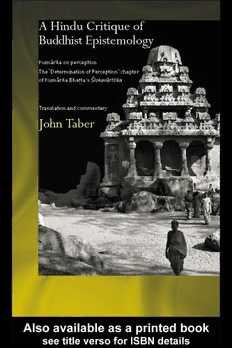
A Hindu Critique of Buddhist Epistemology Kumarila on Perception: The 'Determination of Perception' Chapter of Kumarila Bhatta's Slokavarttika - Translation and Commentary PDF
Preview A Hindu Critique of Buddhist Epistemology Kumarila on Perception: The 'Determination of Perception' Chapter of Kumarila Bhatta's Slokavarttika - Translation and Commentary
A HINDU CRITIQUE OF BUDDHIST EPISTEMOLOGY This is a translation of the chapter on perception (Pratyaks.apariccheda) from Kuma¯rila Bhat.t.a’s magnum opus, the S´lokava¯rttika, which is one of the central texts of the Hindu response to the logico-epistemological school of Buddhist thought.ItiscrucialforunderstandingthedebatesbetweenHindusandBuddhists aboutmetaphysical,epistemological,andlinguisticquestionsduringtheclassical period. In an extensive commentary, the author explicates the argument of the Pratyaks.apariccheda verse by verse while also showing how it relates to ideas and theories of other Indian philosophers and schools. Notes to the translation and commentary go further into the historical and philosophical background of Kuma¯rila’sideas. ThebookincludesanintroductioncontainingasummaryofthehistoryofIndian epistemology,anoverviewofKuma¯rila’sphilosophy,andaseparatesynopsisand analysis of Kuma¯rila’s text. It is a valuable contribution to the field of Indian philosophicalstudies. JohnTaberisAssociateProfessorofPhilosophyattheUniversityofNewMexico, whereheteachescoursesinAsianthoughtandcontinentalphilosophy.Hisresearch has focused on the history of Indian philosophy, especially logic, epistemology, andmetaphysicsduringtheclassicalperiod, 500–1200ce. Heisalsotheauthor of TransformativePhilosophy:AStudyofS´an˙kara,Fichte,andHeidegger. ROUTLEDGECURZON HINDU STUDIES SERIES Serieseditor:FrancisX.Clooney,SJ O C H S TheRoutledgeCurzonHinduStudiesSeries,inassociationwiththeOxfordCentre forHinduStudies, intendsprimarilythepublicationofconstructiveHindutheo- logical,philosophicalandethicalprojectsaimedatbringingHindutraditionsinto dialoguewithcontemporarytrendsinscholarshipandcontemporarysociety,and withtheparticularconcernsofHinduslivinginIndiaandabroadtoday.Theseries alsoinvitesproposalsforannotatedtranslationsofimportantprimarysourcesand studiesinthehistoryoftheHindureligioustraditions. EPISTEMOLOGIESANDTHELIMITATIONSOF PHILOSOPHICALINQUIRY DoctrineinMadhvaVedanta DeepakSarma AHINDUCRITIQUEOFBUDDHISTEPISTEMOLOGY Kuma¯rilaonperception The“DeterminationofPerception”chapterof Kuma¯rilaBhat.t.a’sS´lokava¯rttika Translationandcommentary JohnTaber A HINDU CRITIQUE OF BUDDHIST EPISTEMOLOGY ¯ Kumarila on perception The “Determination of Perception” chapter of ¯ ´ ¯ Kumarila Bhatta’s Slokavarttika .. Translation and commentary John Taber Firstpublished2005 byRoutledgeCurzon 2ParkSquare,MiltonPark,Abingdon,OxonOX144RN SimultaneouslypublishedintheUSAandCanada byRoutledgeCurzon 270MadisonAve,NewYork,NY10016 This edition published in the Taylor & Francis e-Library, 2005. “To purchase your own copy of this or any of Taylor & Francis or Routledge’s collection of thousands of eBooks please go to www.eBookstore.tandf.co.uk.” RoutledgeCurzonisanimprintoftheTaylor&FrancisGroup ©2005JohnTaber Allrightsreserved.Nopartofthisbookmaybereprintedor reproducedorutilisedinanyformorbyanyelectronic, mechanical,orothermeans,nowknownorhereafter invented,includingphotocopyingandrecording,orinany informationstorageorretrievalsystem,withoutpermissionin writingfromthepublishers. BritishLibraryCataloguinginPublicationData Acataloguerecordforthisbookisavailable fromtheBritishLibrary LibraryofCongressCataloginginPublicationData Acatalogrecordforthisbookhasbeenrequested ISBN 0-203-42062-4 Master e-book ISBN ISBN0–415–33602–3(PrintEdition) FOR DEB CONTENTS Seriesforeword ix Preface xi Introduction 1 ThePratyaks.aparicchedaincontext 1 TheargumentofthePratyaks.apariccheda 15 Kuma¯rilaversusDharmak¯ırtionconceptualizedperception 29 ThePratyaks.aparicchedaandmodernphilosophy: Kuma¯rila’scritiqueoftheSuperimpositionTheory 38 1 “TheDeterminationofPerception”(Pratyaks.apariccheda):text andcommentary,part1 44 1.1 CritiqueoftheinterpretationofM¯ıma¯m.sa¯su¯tra1.1.4as adefinitionofperception 44 1.2 Thecorrectinterpretationofthesu¯traasarejectionof yogicperception;theconstrualoftheword ‘existing’(sat) 51 1.3 Discussionoftheterm‘connection’;theproblemof perception atadistance 58 1.4 Discussionoftheexpression‘ofaperson’ 64 1.5 Discussionoftheexpression‘thearisingofacognition’ 66 1.6 Theidentificationoftheprama¯n.a 70 1.7 RefutationoftheBuddhistidentificationof prama¯n.aandphala 78 1.8 Summary 83 1.9 Therelationofperceptiontotheotherprama¯n.as 84 vii CONTENTS 2 “TheDeterminationofPerception”(Pratyaks.apariccheda): textandcommentary,part2 93 2.1 Thedefenseofconceptualizedperception:introduction 93 2.2 CritiqueoftheAdvaitaVeda¯ntapositionthat nonconceptualizedperceptionapprehendsthehighest universal 94 2.3 Defenseofconceptualizedperceptionagainstinitial Buddhistobjections 96 2.4 Theroleofthemindinconceptualizedperception 101 2.5 Conceptualizedperceptionsarenoterroneous cognitions 106 2.5.1 Therelationofpropertyandproperty-bearer 106 2.5.2 Theunityoftheobjectofdifferentsenses 112 2.5.3 Conceptualizedcognitionsdonotinvolvethefalse superimpositionofaworduponitsmeaning 118 2.5.3.1 Wehaveindependent,nonlinguistic cognitionsofobjects 118 2.5.3.2 Absurdconsequencesofthesuperimposition doctrine 126 2.5.3.3 Anindependentawarenessofmeaningis essentialforlearninglanguage 131 2.5.3.4 Itisimpossibletoconfusewordand meaning 133 2.5.3.5 FurtherargumentsagainsttheSuperimposition Theory 135 2.5.4 Evenifconceptualizedcognitionsinvolved superimpositiontheywouldnotnecessarilybefalse 136 2.6 Conceptualizedperceptionsarenotmemories 140 2.7 Aconceptualizedperceptiondoesnotattributesomething totheobjectthatdoesnotbelongtoit 143 2.8 Conclusion:theotherprama¯n.asarebasedon perception 145 Appendix:theSanskrittextofthePratyaks.apariccheda 149 Notes 163 Bibliography 239 Index 251 viii SERIES FOREWORD TheRoutledgeCurzonHinduStudiesSeries, publishedincollaborationwiththe OxfordCentreforHinduStudies,intendsprimarilythepublicationofconstructive Hindutheological,philosophical,andethicalprojects.Thefocusisonissuesand concernsofrelevancetoreadersinterestedinHindutraditionsandawiderrangeof relatedreligiousconcernsthatmatterintoday’sworld.TheSeriesseekstopromote excellentscholarshipand,inrelationtoit,anopenandcriticalconversationamong scholars and the wider audience of interested readers. Though contemporary in itspurpose,theSeriesalsorecognizestheimportanceofacontemporaryretrieval of the classic texts and ideas, beliefs and practices, of Hindu traditions. One of its goals then is the promotion of fresh conversations about what has mattered traditionally. It is therefore most fitting that John Taber’s A Hindu Critique of Buddhist Epistemology:Kuma¯rilaonPerceptionshouldbeoneofthefirstvolumesinthe Series.M¯ıma¯m.sa¯ritualthinkingandexegesis,traditionallylistedasoneofthesix majorsystemsofHindutheologyandphilosophy(dars´ana), isasuperlativeand uniquely Indian mode of thought. As Taber explains in his own Preface and his Introduction,Kuma¯rilaBhat.t.aisnotonlyaleadingM¯ıma¯m.sa¯thinker,butalsoone of the leading intellectuals of the Indian tradition, a formidable exemplar of the intellectualrigor, analysis, andargumentationforwhichIndiaisrightlyfamous. Although Kuma¯rila’s S´lokava¯rttika – of which a major chapter is translated and interpretedhere–hasbeenavailableinEnglishfornearlyacentury,sogreataclas- sicdeservesthebenefitofmultiplerenderingsinEnglish,andindeedhaslongbeen inneedofathoroughlyaccuratetranslationandelaboration.Taber’spainstaking yetlucidtranslation,accompaniedbyvaluablenotes,bringsKuma¯rila’sarguments tolife,inawaythatisaccessibleevenforsomeonewhoisnotamasterofSanskrit, whilestillsatisfyingtrainedSanskritists. AsreadersunfamiliarwithKuma¯rilaBhat.t.agraduallyfindtheirwayintothis demanding but richly rewarding treatise on perception, they may at first won- der whether and how this technical argumentation enhances our knowledge of Hindureligioustraditions,eventheritualtraditionsconnectedwithM¯ıma¯m.sa¯.Yet AHinduCritiqueofBuddhistEpistemologyclearlyilluminesanimportantdimen- sionoftheHindutraditions–inpartsimplybyshowingusaleadingBrahmanical ix
